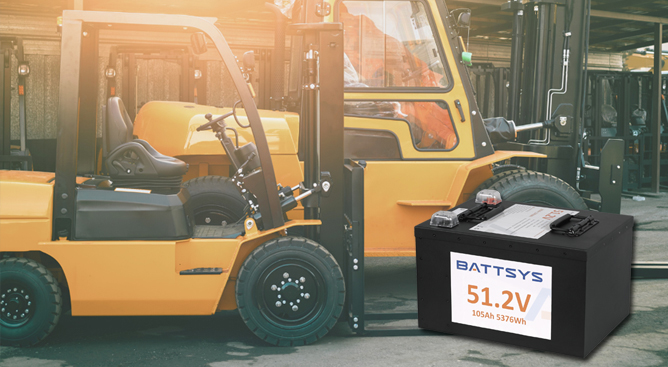The difference between lead-acid batteries and lithium batteries in electric forklifts.
With the development of industry, the forklift industry has begun to grow rapidly. This time, forklift batteries are more environmentally friendly and favored by larger enterprises. At present, electric vehicles mainly have lithium batteries and lead-acid batteries. With the development of new energy vehicles and the gradual improvement and maturity of lithium battery technology, many companies will choose lithium battery forklifts. However, some companies still need to choose lead-acid batteries or lithium batteries.
BATTSYS
forklift battery manufacturers have combined the advantages of lead-acid batteries and lithium batteries to explain how to choose:
1、 Analyze from the perspective of service life and number of cycles
The lifespan of forklift batteries is directly related to costs, and in general, the lifespan of lead-acid batteries can reach 5 years. So what about lithium batteries? Some people say they have a cycle life of 300-500 times, which is much shorter than that of budget batteries. However, in reality, the forklift lithium battery we are referring to is a lithium iron phosphate battery, not the general lithium battery commonly used in 3C electronic products. The theoretical service life is over 2000 cycles, and the service life is 5-10 years. It has no memory effect and does not require frequent replacement;
So, the lifespan of lithium batteries is much longer than that of lead-acid batteries.
2、 Comparing discharge performance
In terms of discharge performance, on the one hand, forklift lithium batteries are much larger than forklift batteries in high current discharge, and can continue to discharge at a rate of 35C, providing stronger power and lifting heavier and heavier goods; On the other hand, in terms of charging, forklift lithium batteries provide a fast charging rate of 3C to 5C, which is much faster than forklift lead-acid batteries, saving a lot of charging time and improving work time and efficiency. However, it should be noted that lithium batteries do not require the use of lead-acid battery chargers for charging.
3、 Analysis of installation, replacement, and maintenance convenience
Under the same capacity and discharge requirements, forklift lithium batteries are lighter and smaller in size. They are much more convenient than bulky forklift lead-acid batteries for battery replacement, saving time and improving work efficiency.
Lithium battery maintenance free: no need to add water, no dripping, corrosion or other pollution. Improve operational efficiency with a fast charging mode that takes 1-3 hours and is suitable for multi shift operations. Instant charging eliminates the time and safety risks of battery replacement.

4、 Comparing battery prices
Forklift lithium batteries are more expensive than
forklift batteries in terms of both raw material costs and manufacturing process costs. Therefore, forklift lithium batteries are more expensive than forklift batteries on the market.
Although lithium batteries have high procurement costs, their charging efficiency is over 97% (lead-acid batteries have an efficiency of only 80%) and they have no memory. Taking the 500AH battery pack as an example, it can save over a thousand yuan in charging costs annually compared to lead-acid batteries.
Have you understood the competition between lead-acid batteries and lithium batteries for electric forklifts? When choosing forklift batteries, if you don't know how to choose, you can contact a professional forklift battery manufacturer for consultation and understanding,
